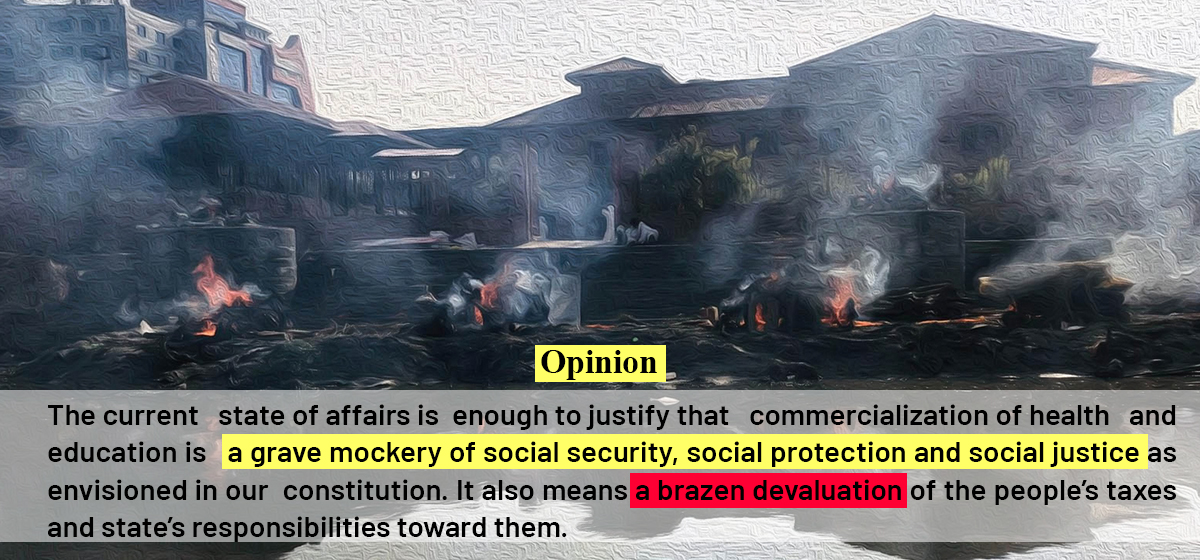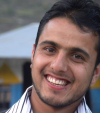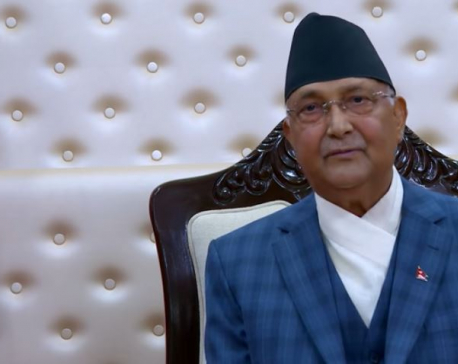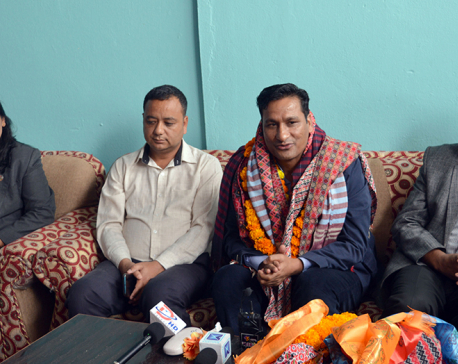
OR


Kamal Subedi
Kamal Subedi has been working as an Online Correspondent for Republica English daily since July, 2019 after gaining experience as an education professional for one and a half decades. Subedi writes on political, social and contemporary issues. He is also a multimedia professional, especially versed in infographics and graphics. He also has a knack for fact-checking.preritkamal@gmail.com
More from Author
- Nepal Constitutional Crisis: What happens after 5 PM today?
- Do we have a government?
- PM Oli fails to secure parliament’s confidence, what next now?
- PM Oli is seeking a vote of confidence today in parliament. Will he survive?
- COVID-19 in Nepal: Not only infection number, but also recovery number is on the rise
Until and unless the people realize that they have a state at the time of emergency, the political system - irrespective of how fancy it may sound - will neither flourish nor institutionalize. The country turns out to be a laboratory to make experiments of political systems. Anarchy at its worst rules the country. Isn’t it high time we washed our faces before scrubbing the mirror?
The word ‘socialism’ has been used thrice in the Constitution of Nepal - the one promulgated by the Constituent Assembly II in 2015. Commitment to socialism (in the preamble), state’s definition as socialism-oriented (in Article 4) and the state’s objective to develop a socialism-oriented independent and prosperous economy (in Article 50 (3)) have been inscribed in the ‘greatest achievement’ that Nepal ever made in its constitutional and political history.
The Oxford Advanced Learners’ Dictionary (OALD) defines socialism as ’a set of political and economic practices based on the belief that everyone has an equal right to a share of a country’s wealth and that the government should own and control the main industries’. Six years have shot by since the country got a pro-socialist constitution. However, it would not be otherwise to say that the country has not made even a single stride toward socialism. Clearly, the words and spirit of the constitution have nothing to do with our reality. Amidst the widespread crisis of the coronavirus pandemic, people have hardly realized that they are under a political system which is headed toward socialism.
Traumatized by privatization and commercialization
In this so-called socialism-oriented state, our crucial health and education sectors are controlled primarily by the private sector. As it is obvious that the private sector seeks good profits, the country’s health and education sectors both have been engulfed by commercialization. With the state shying away from its foremost responsibilities and obligations to its citizens, the private sector has been taking a negative advantage of the situation. In most cases, those who loudly advocate socialism and urge for the state's role in addressing the people’s dire concerns relating to basic needs including health and education, are found to have betrayed the people by deceitfully engaging in lucrative businesses. In this situation, we can’t think of a pro-people state as the politicians, who are supposed to be the key policy makers, themselves are busy making a total mockery of the system and even their back-to-back commitments.
If it were a socialism-oriented state, you would not have to be deprived of the much-needed treatment for you would be equally valued as a key stakeholder. The state is not supposed to make absurd excuses such as ‘it’s not only Nepal where people are dying of the coronavirus, why can’t you see such a situation in the developed American and European countries’. Elected representatives are not supposed to engage in horse trading in the midst of the peaking pandemic. You are never supposed to create any room for complacency for a few kilometers of ‘seasonal’ roads and petty view towers, nor you boast of laying foundation stones and announcing pretentious projects.
When the state fails to address the people’s concerns, the mafias emerge more powerful than ever. Nepal is through this phase, we must admit. As even the young people are dying because of the scarcity of the much-needed medical oxygen, hospitals, which once claimed to be highly-equipped and sophisticated, are now busy either turning away the patients or compelling them to sign on ‘agreement to die due to the lack of the lifesaving gas’. Regulatory bodies think their job is done just by issuing directives and making public statements. It is true that our elected governments so far have proved to be inefficient. At the same time, the selected government -- the bureaucracy - too, has failed to correct the malafide politicians. Instead, government officials act as the henchmen of the politicians and indulge in policy and financial corruption.
The current state of affairs is enough to justify that commercialization of health and education is a grave mockery of social security, social protection and social justice as envisioned in our constitution. It also means a brazen devaluation of the people’s taxes and state’s responsibilities toward them.
Lacking proactive governance
State mechanisms in Nepal have proved to be reactive, not proactive. When our southern neighbor, India, was grappling with the onset of the second wave of the coronavirus triggered by the deadlier strain, we were busy holding mass gatherings, inaugurating incomplete projects and celebrating social events. Experts and media outlets at home as well as abroad criticized the country’s PM Oli many a time for making unproven recommendations such as sneezing, drinking turmeric water and gargling with a mixture of guava leaves and boiled water, as a cure for the coronavirus, which has been frequently transforming its form and getting more and more severe since it was detected in December, 2019. Oli even falsely claimed that Nepal’s COVID-19 situation was under control, in a virtual interview with CNN a few days ago.
No preparations were made in Nepal even as neighboring India was being ravaged by the deadlier strain nor any precaution from the government level was applied. On Wednesday (May 12), the private hospitals were asked to mandatorily set up oxygen plants in the next 15 days, which the hospitals collectively denied. Our reactive response and administration mechanism has turned out to be a chronic problem. Had we applied all possible measures, we would not have incurred the loss of 1,000 people in the past one month. Since the first fatality was reported on May 16, 2020, we lost nearly 5,000 people, most of them were of young age.
Irrelevant political gambling
Coming up with packages to heal the pandemic-haunted economy following the first wave of the virus last yearIt should be a top priority of the government. However, Prime Minister Oli pushed the country toward chaos and uncertainty just because of his party’s internal row. The House was unconstitutionally dissolved. Priorities were changed. Political parties were indulged in blame games. They could never take the coronavirus as a common enemy to fight against. They could never think along this line. The prime minister even announced snap polls at a time the country was reeling under an acute economic crisis. Last week, on the one hand, the country was reporting record-high daily corona case-counts and deaths, the political parties, particularly the KP Oli-led UML, was busy mustering a majority through unhealthy means. Back-to-back political meetings at a time when the people were forced to stay indoors citing corona transmission, resembling the indifference of Nepal’s political spectrum in fighting against the pandemic.
Forgotten promises
In 2017, two communist forces -- CPN-UML and CPN (Maoist Center) formed an alliance for the first parliamentary election under the new constitution. They pledged unprecedented stability and, of course, promised to transform the country’s slow development process for good. Nepalis, who had been troubled by a series of political instability over the decades, found it quite convincing and endorsed the communist party’s election agenda through nearly two-thirds votes. However, the two parties, which later merged to become the Nepal Communust Party (NCP), soon forgot their promises, threw their ‘high sounding’ manifesto to the trash bin and engaged in game of thrones. The Supreme Court, on March 7, 2021, invalidated the NCP as its name conflicted with Rishi Kattel’s party, and asked the two parties to come up with a new name in the next 15 days. Proving that the ‘unity’ was only to secure a majority in the election, the parties did nothing significant to untie together. This was sure to invite a series of instabilities.
The KP Oli-led government, onced formed under Article 76 (1) of the constitution, has now turned into one constituted as per Article 76 (3) after he lost a trust vote in parliament on May 10 and no other parties could put together the support of a majority of lawmakers. He is supposed to seek a vote of confidence before June 15 as per the constitutional provision, which seems to be elusive. Oli is desperate to go for mid-term polls just to justify his December 5 House dissolution move. He might have a number of reasons to claim that he is forced to go for an early election. But, who is going to realize that people need stability, a functioning government and strong state institutions.
Until and unless the people realize that they have a state at the time of emergency, the political system - irrespective of how fancy it may sound - will neither flourish nor institutionalize. The country turns out to be a laboratory to make experiments of political systems. Anarchy at its worst rules the country. Isn’t it high time we washed our faces before scrubbing the mirror?
You May Like This

Govt ready to amend constitution on the basis of justification: PM Oli
KATHMANDU, Sept 18: Prime Minister KP Sharma Oli has said that the government is ready to amend the constitution, if... Read More...

Cabinet reshuffle is prerogative of Prime Minister: Minister Basnet
SURKHET, Oct 19: Minister for Forest and Environment Shakti Bahadur Basnet has said that Prime Minister has the right to... Read More...

Internet Governance Forum begins in Nepal to launch discussions on internet ecosystem
Internet Governance Forum begins in Nepal to launch discussions on internet ecosystem ... Read More...



Leave A Comment